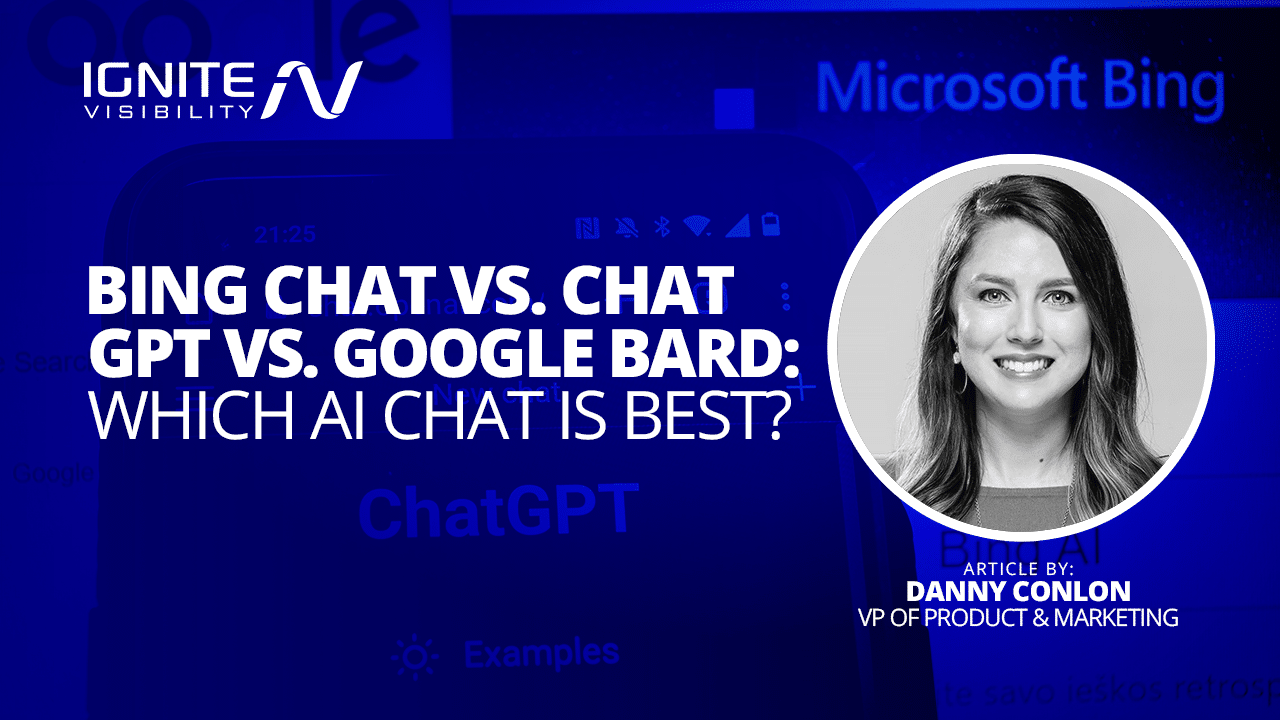
AI chatbots have quickly ascended to the forefront of customer service and marketing tools.
In the vanguard of this revolution are three heavyweights: Bing Chat, ChatGPT, and Google Bard. This article will comprehensively compare Bing Chat vs. ChatGPT vs. Google Bard and try to determine which is best for digital marketing.
Designed with an expansive language model, ChatGPT quickly made headlines for its ability to understand and respond to prompts with human-like precision.
Not one to be left behind, Google introduced its own contender, Google Bard, in 2023, touted for its impressive language processing capabilities and ability to generate contextually relevant responses. All the while, Microsoft acquired OpenAI and leveraged GPT to build its own search engine AI.
But why does it matter to us, especially those in the marketing realm? It’s simple: these AI chatbots have become instrumental in optimizing workflows.
With their ability to provide instant responses, guide customers, and even offer personalized recommendations, these chatbots transform how businesses interact with their audiences and create content for them.
Yet, with such powerful tools at our disposal, a critical question arises: Which of these AI chatbots fits our uses the best?
To answer this question, we’ll delve into real-world examples and performance data from each of these AI chatbots, highlighting their strengths, weaknesses, and overall user experiences.
As the saying goes, it’s all in the details. And in the race for AI supremacy, those details could make all the difference.
ChatGPT
Pricing: ChatGPT has a tiered pricing model. It’s available for free as a research preview. But users looking for more features and higher quotas can opt for a ChatGPT Plus subscription plan at $20/month.
API: OpenAI offers an API for ChatGPT, which developers can use to integrate ChatGPT into their applications. It enables developers to leverage the capabilities of ChatGPT through simple API calls.
Developer: ChatGPT is developed by OpenAI, an artificial intelligence research lab comprising the for-profit corporation OpenAI LP and its now-parent company Microsoft.
Technology: ChatGPT is based on the GPT (Generative Pre-trained Transformer) architecture, known for generating human-like text. It uses a large-scale language model that’s been trained on a vast dataset of text from the internet.
Information Access: ChatGPT doesn’t have access to real-time information (outside of the Bing Search plugin, which isn’t the same as training on newer data). Its responses are based on the data available up to its last training update, which was in September 2021.
Pros/Cons:
- Pros: ChatGPT provides human-like text responses, high flexibility, and a large community of developers.
- Cons: It may sometimes provide incorrect or outdated information and may require fine-tuning for specific use cases.
Google Bard
Pricing: Google Bard is free, for now, as part of a public training program.
API: The Google Bard API is currently in a closed beta, available only to approved developers.
Developer: Google Bard is developed by Google’s AI team.
Technology: Google Bard is based on advanced language processing algorithms. The underlying technology is similar to the transformers-based architecture of GPT.
Information Access: In addition to the data it’s been trained on, Bard can access the internet much more efficiently than ChatGPT with the Bing search plugin.
Pros/Cons:
- Pros: Google Bard is excellent for using the internet, which ChatGPT has trouble with
- Cons: Its output is not as high-quality as GPT-4.
Bing Chat
Pricing: Bing Chat is free for all to use.
API: Microsoft offers the Bing Search API, which developers can use to integrate Bing’s search capabilities into their applications.
Developer: Microsoft developed Bing Chat.
Technology: Bing Chat is built on OpenAI’s GPT-4.
Information Access: Bing has full access to the internet
Pros/Cons:
- Pros: Bing Chat benefits from integration with Bing Search and has the backing of OpenAI’s development capabilities.
- Cons: It runs slightly slower than Bard
Comparing ChatGPT, Google Bard and Bing Chat for Specific Use Cases
ChatGPT, Google Bard and Bing Chat each have their unique set of advantages and limitations making it hard to determine which is best overall. To determine which reigns supreme, we will examine specific use cases within digital marketing.
By examining real-life examples, we aim to shed light on the strengths and weaknesses of each system, helping businesses make informed decisions about the most suitable chat solution for their needs.
ChatGPT vs Bard vs Bing: Blog Idea Generation
Query: “Give me ideas for blog posts about SEO.”
ChatGPT
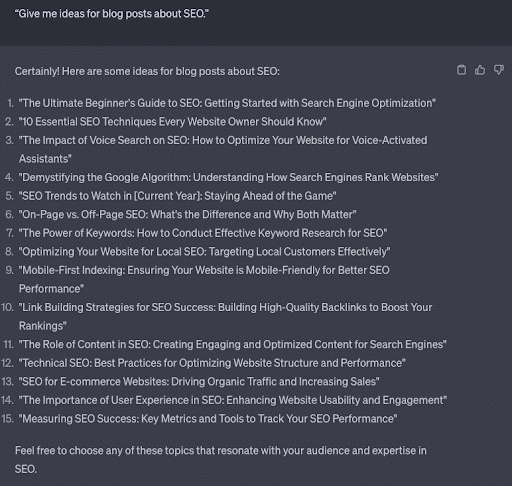
ChatGPT Query
Bard
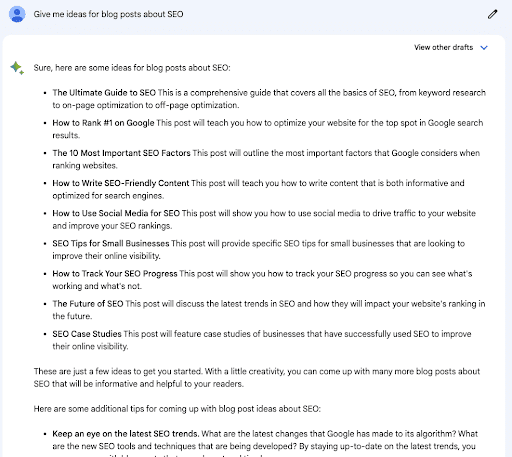
Bard Query Example
Bing Chat
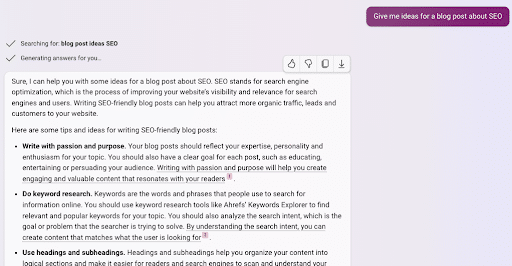
Bing Query
Analysis
Both ChatGPT and Bard provided straightforward answers, while Bing’s was much less actionable. This is a prime example of Bing AI being less of a thought engine and more of an internet search engine.
While both ChatGPT and Bard gave the best ideas, ChatGPT’s topics were more creative, while Bard’s were more straightforward. Whether you should use one or the other will depend on the topic you are ideating around.
ChatGPT vs Bard vs Bing: Title Tag Variations
Query: “Make variations of this title tag: ‘Best ChatGPT Use Cases of 2023”
ChatGPT
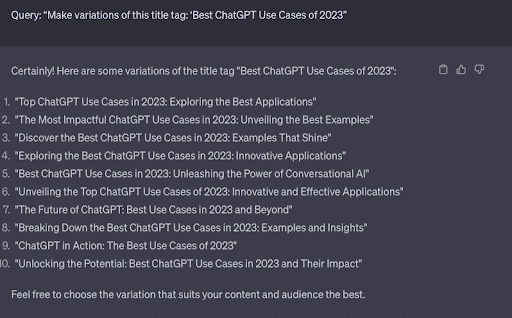
Title Tag Variations Query – ChatGPT
Bard
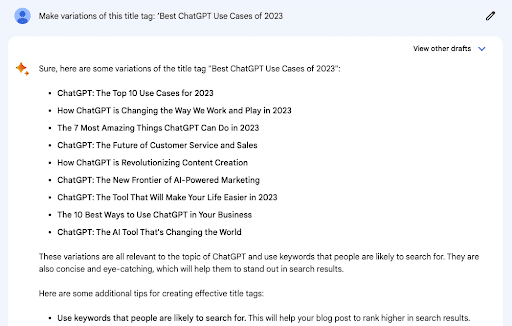
Title Tag Variations Query – Google Bard
Bing Chat
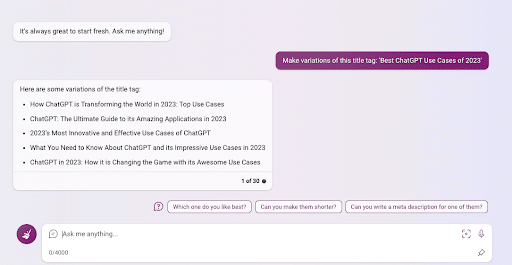
Title Tag Variations Query -Microsoft Bing AI
Analysis
All three competed on nearly equal footing, though Bing AI lagged behind in creativity. Its suggestions weren’t bad, but not as flavorful as the former two.
However, note that Bard inherently knew what a title tag was and gave suggestions under 60 characters, (the max length of a title tag) while ChatGPT did not. This is a piece of information someone should know and add to the prompt if using ChatGPT (ie, “Make variations of this title tag: ‘Best ChatGPT Use Cases of 2023’ under 60 characters”).
ChatGPT vs Bard vs Bing: Title Tag Variations
Query: “Write copy for a quick marketing email promoting an SEO link-building service.”
ChatGPT
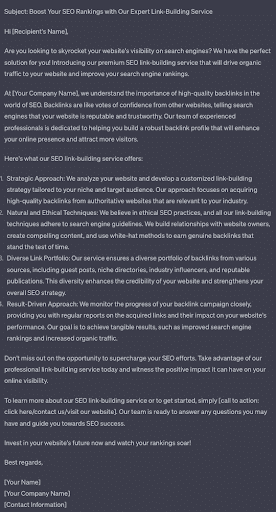
Email Copy Ideation Query Answers – ChatGPT
Bard
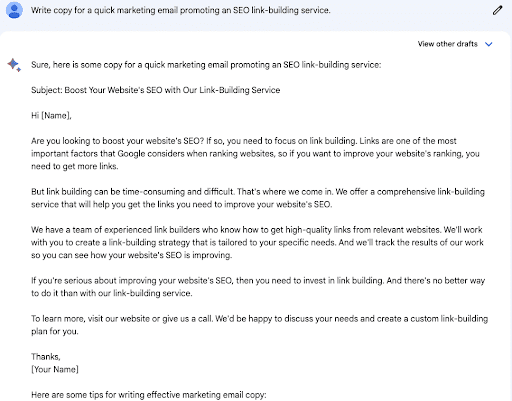
Email Copy Ideation Query Answers – Bard
Bing Chat
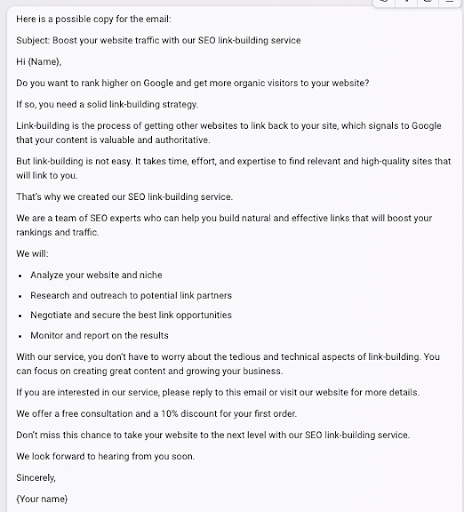
Email Copy Ideation Query Answers – Bing AI
Analysis
While all provided a solid starting point, all copy was highly generic. However, more precise prompting would bring about much more compelling copy. We’ll call this one a tie.
ChatGPT vs Bard vs Bing: Creativity
ChatGPT
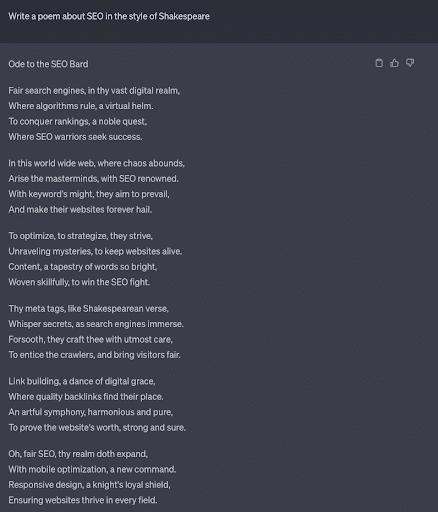
Creativity Prompts – ChatGPT
Bard
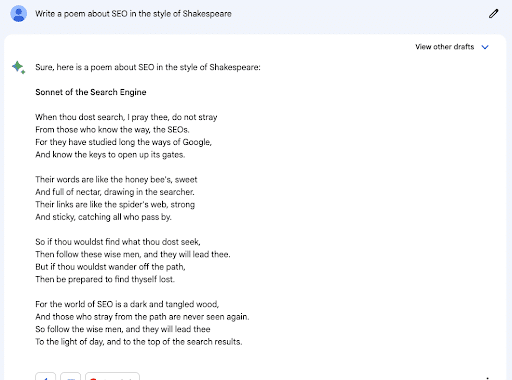
Creativity Prompts – Google Bard
Bing Chat
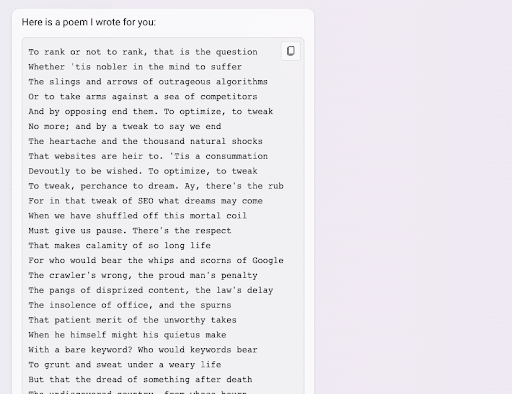
Creativity Prompts – Bing Chat
Analysis
While not a perfect test, we felt asking the language models to write a poem about a given topic in Shakespeare’s style would be a decent litmus test for its wordcraft.
And even in this microcosm, the GPT-4 model (used by ChatGPT and Bing) shines brightly over Bard. This reflects our collective experience between the three—Bard has some serious catching up to do.
ChatGPT vs Bard vs Bing: Query Response Accuracy
ChatGPT – While ChatGPT’s responses are mostly on point, it tends to hallucinate more minor details. This is likely due to the nature of its training—it aggregates massive amounts of data to predict “desirable” responses for a given query.
Bard – Bard seems to be better about hallucination, but it’s far from infallible. Famously, at its initial demo, it hallucinated a fact about the James Webb telescope, much to the dismay of Google and those anticipating a great product.
Bing Chat – By virtue of being plugged directly into the internet, Bing AI is better at not hallucinating information. However, it’s far from invulnerable, and we noticed several instances in which it interpreted data incorrectly to the point of being a de-facto hallucination.
Analysis – All three language models suffer from some degree of hallucination, though we expect this issue to improve over time.
Conclusion
In the ultimate showdown between the major language models, OpenAI’s GPT (which powers both ChatGPT and Bing AI) stands supreme over its Googly counterpart.
While Bard is far from useless, it’s hard to compare to its superior competitors, and it’s not surprising to have seen that Bard’s adoption has been disappointing. After all, they’re meant for the same purpose, but one performs its task much better than the other.
Want to Get the Most Out of Your Digital Marketing Campaigns?
Ignite Visibility has a team of expert digital marketing professionals. We leverage the power of various digital marketing services to help businesses reach customers efficiently, helping them achieve their overall business goals. Our expert strategists work closely with clients to understand their unique needs and design customized SEO, PPC and email strategies that maximize return on investment. Whether it’s using AI to amplify your SEO strategy or implementing it into your PPC programs, our full-scale digital marketing agency ensures our clients receive optimal results.
Want to learn more about our digital marketing management services?
